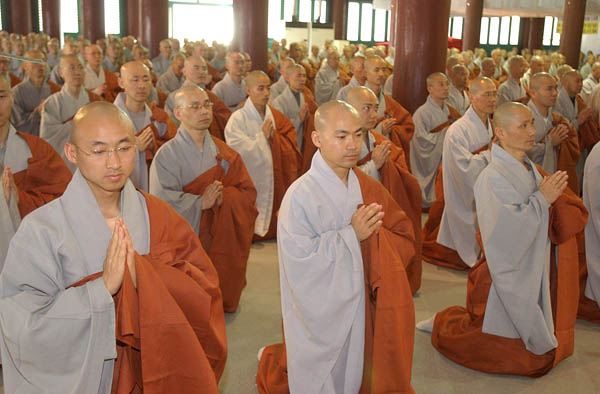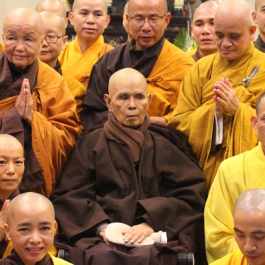
From koreatimes.co.kr
The Association of Korean Buddhist Orders has announced the publication of Buddhist National Treasures of Korea. This new 480-page volume of cultural heritage catalogues the history of every Buddhist artifact in South Korea that has been designated by the state as a national treasure.
Observing that Buddhist artifacts make up more than half of Korea’s total collection of state-designated national treasures, the association stated that Buddhist National Treasures of Korea would contribute to improving the understanding of Korean Buddhism and related rare and ancient artifacts that can normally only be viewed by the public by visiting temples and special exhibitions at museums.
“Since Buddhism was introduced to Korea during the Three Kingdoms period (57 BCE–668 CE), the royal court as well as its subjects continued to establish temples and stone pagodas, enshrine Buddhist statues and paintings and publish scriptures—both in the country’s golden age and the period of national crisis,” the Association of Korean Buddhist Orders explained. (The Korea Times)
Buddhist National Treasures of Korea provides explanations in both Korean and English of the major characteristics of each treasure as well as their position within the historical, artistic, and cultural contexts of Korean Buddhism. The association said it would distribute a total of 2,000 copies to foreign embassies in Korea, as well as to Korean Cultural Centers, Buddhist temples, libraries, and universities in Korea and overseas.
Founded in 1967, the Association of Korean Buddhist Orders is made up of 25 member Buddhist orders, including the Jogye Order of Korean Buddhism, South Korea’s largest Buddhist order. The association has released a series of publications over the years promoting and cataloging Korea’s Buddhist history, heritage, and culture, as well as Buddhist teachings and practices.

Buddhism was first introduced to Korea via China in the fourth century, during the Three Kingdoms period, some 800 years after the parinirvana of Shakyamuni Buddha. Buddhism spread across the peninsula to become the most widespread religious and cultural influence in the Northern and Southern States period (698–926 CE), when the Unified Silla and Balhae kingdoms coexisted in the south and north, and in the subsequent Goryeo kingdom (918–1392).
Confucianism also came from China to Korea, where it was reformulated during the Goryeo period. The Joseon kingdom (1392–1910) established Korean Confucianism as the state ideology and religion, leading to some 500 years of suppression of Korean Buddhism. The number of functioning Buddhist monasteries dwindled during the Joseon period, from several hundred to just 36, and male and female monastics were prohibited from entering cities.
Buddhism’s later restoration in Korea was due in large part to the role of Buddhist monks in defending against Japanese invasions of Korea from 1592–98, and to the work of Seon master Seosan Hyujeong (서산대사; 1520–1604), who was instrumental in unifying Buddhist doctrinal study and practice in Korea.
Today, there are several schools of Buddhism in Korea, including esoteric Jingak; Cheontae, a revival of Tientai Buddhism; and Won, a modern reformed Buddhism. Seon (Korean Zen) is the most widespread school, and is mainly represented by the Jogye and Taego orders. The Jogye Order of Korean Buddhism operates the majority of Buddhist temples in South Korea.
According to census data for 2015, the majority of South Korea’s population—56.1 per cent—holds no religious affiliation. Christians make up the largest religious segment of the population at 27.6 per cent, while Buddhists account for 15.5 per cent.
See more
Korean Buddhist association releases book on Buddhist national treasures (The Korea Times)
한국불교종단협의회, 한국불교소개 외국어 책자 “聖寶” 발간 (미디어 붓다)
Related news reports from BDG
Korean Buddhist Monks Hold Conference Denouncing Perceived Discrimination
Jogye Order Confers Award on Pakistan’s Ambassador to South Korea
Korean Buddhist Manuscripts Exhibited for Hangul Day
Ven. Wolju, Social Activist and Former Leader of Korea’s Jogye Buddhist Order, Dies at 87
Engaged Buddhism: Ven. Pomnyun Sunim Delivers Compassion to the Vulnerable in Korea
Buddhist Temple to Open Tripitaka Koreana to the Public for the First Time














